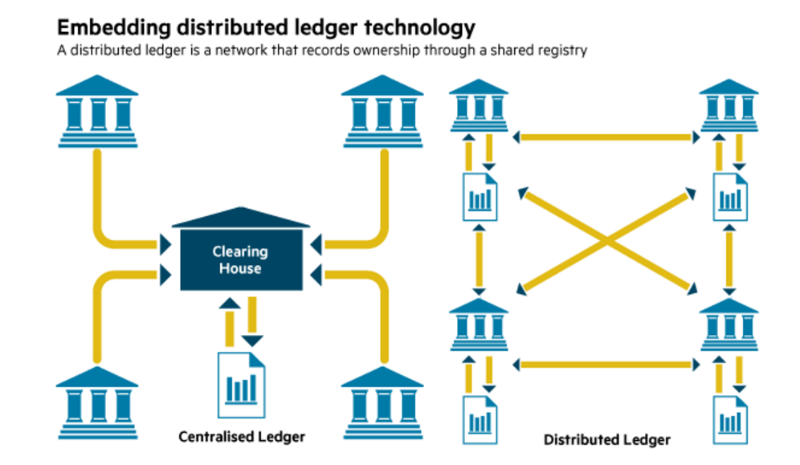Excerpt via the Sovereign Wealth Fund Institute (SWFI), a global organization that studies sovereign wealth funds, pensions, superannuation funds, central banks, endowments and other long-term public investors. We thank SWFI’s kind support and patronage.
While they may not grab as many headlines as big-name government or corporate initiatives, opportunities to unleash using blockchain technologies the latent economic potential at the bottom of the pyramid remain equally important.
The reasons for exploring these opportunities have less to do with altruism and more to do with the risks financial inequality poses.
The World Economic Forum, a global organization which counts among its members the world’s top leaders in industry, government and academia, has called inequality as one of the “key challenges of our time.”
“Blockchain could be one solution,” says Don Tapscott author of “Blockchain Revolution.” “By lowering barriers to financial inclusion and enabling new models of entrepreneurship, the tonic of the market could be brought to bear on the dreams and ideas of billions of the unbanked.”
Why This MattersEconomically excluded people, especially the youth, end up “feeling disenfranchised and become easy fodder for conflict … reducing social cohesion and security, undermining democracies and crippling hopes for sustainable development and peace,” the WEF report says.
And while many will agree that today’s world is largely a better place for more and more people, “major structural forces in the world economy, such as globalization or technology change, are not driving income distribution outcomes in an unfair way in all countries,” says another study by the Brookings Institute.
Blockchain Use Cases
Abra, founded just in 2014, is building a global digital asset management system on the bitcoin blockchain with stated aims to turn “every smartphone into a teller,” and targeting remittances in the Philippines, where about $30 billion are sent home by overseas family relatives.
By allowing users to store digital cash in a digital wallet on their mobile devices, Abra plans to effectively displace a conventional bank’s historically two very essential roles – payments and value storage.

In Eastern Europe, BitFury is partnering with the Republic of Georgia to create a blockchain-based land title registration service, an estimated $20 billion problem for more than 5 billion people worldwide.
The problem is acute in other poor and corruption-plagued countries like Honduras, where 60% of land remains undocumented.

Back in Asia, Everex is attempting to use Blockchain to better manage how MFIs are operated, and making sure MFI loans end up in the right hands.
Everex’s Chainy, Ethplorer, Crytocash and its digital wallet called Everex Wallet – products that provide means of storing and sending funds on the Ethereum network – aim to use the blockchain to monitor transactions, increase funding transparency and detect fraud.

What’s Needed – Leadership and Collaboration
Notably common to all these use cases, and we can be certain in all other potential use cases, are partnership and experimentation among the technology providers, governments and other organizations.
Blockchain, for all its promises, remains at the time of this writing, a complex technology, requiring education, concerted buy-in and in some cases, sponsorship by government or political entities.
Read Some More
Sovereign Wealth Fund Institute, “A Potential Avenue to Increased Financial Inclusion,” March 2018. https://www.swfinstitute.org/swf-news/blockchain-a-potential-avenue-to-increased-financial-inclusion/
New York Times, “Honduras Land Conflict Highlights Polarization,” September 2011, http://www.nytimes.com/2011/09/16/world/americas/honduras-land-conflicts-highlight-polarization.html
World Economic Forum, “Future of Financial Services: Payment Rails”, 2015, http://reports.weforum.org/future-of-financial-services-2015/new-payment-rails/
World Economic Forum, “Outlook Global Agenda 2015,” November 2015, http://reports.weforum.org/outlook-global-agenda-2015/top-10-trends-of-2015/1-deepening-income-inequality/
Finanser, “Nine Standout Startups focused on Blockchain payments,” August 2016, https://thefinanser.com/2016/08/nine-standout-start-ups-focused-upon-blockchain-payments.html/
Harvard Business Review, “The Truth About Blockchain,” January 2017, https://hbr.org/2017/01/the-truth-about-blockchain
Coindesk, “Goldman Sachs Granted Setlcoin Patent”, July 2017 https://www.coindesk.com/goldman-sachs-granted-setlcoin-cryptocurrency-patent/
Techinasia, “Blockchain Everex Token Sale,” July 2017, https://www.techinasia.com/blockchain-everex-seed-tokensale
Forbes, “Blockchain Tops $4.5 Billion in Private Funding but Deal Growth Slows,” September 2017, https://www.forbes.com/sites/jonathanponciano/2017/09/22/blockchain-tops-4-5-billion-in-private-funding-this-year-but-deal-growth-stalls/#67ee2ec874c6
Reuters, “Bank-backed R3 launches new version of its blockchain,” October 2017, https://www.reuters.com/article/us-r3-blockchain/bank-backed-r3-launches-new-version-of-its-blockchain-idUSKCN1C80MS
Deloitte, “Evolution of Blockchain: Insights from the Github platform,” November 2017, https://www2.deloitte.com/insights/us/en/industry/financial-services/evolution-of-blockchain-github-platform.html
Medium @Prateek Goorha, “Please Let Blockchain Not Be a Trust Machine,” November 2017, https://medium.com/@goorha/please-let-blockchain-not-be-the-trust-machine-c3195f7468c
Fool, “Amazon Strikes A New Blockchain Partnership,” March 2018, https://www.fool.com/investing/2018/03/05/amazon-strikes-a-new-blockchain-partnership.aspx
Time, “Women Worldwide Struggle to Access Banking Services. Bitcoin Is Only Making That Worse, October 2018, http://time.com/5431809/blockchain-financial-inclusion-gender-gap/?xid=tcoshare
Tapscott, Don and Alex, “Blockchain Revolution: How the Technology is Changing Money, Business and the World”, Penguin Random House, ISBN 9781101980132, 2016-
“Blockchain for Ethical Design Framework,” Beeck Center, Center for Social Innovation at Georgetown University.








